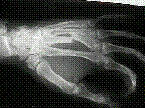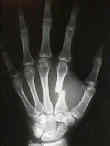- Discussion:
- displacement of metacarpal shaft fractures is prevented by intermetacarpal ligaments and intrinsic muscles;
- the border metacarpals (thumb, index, and little) are not supported as well as the ring and long metacarpals and are therefore more likely to displace;
- effect of shortening:
- in short oblique fractures, the average shortening is about 5 mm;
- obstacles to further shortening is the deep intermetacarpal ligament and interosseous muscles;
- for each 2 mm increment of shortening, there was a corresponding 7 deg extensor lag at the MCP joint;
- reference:
- Metacarpal shaft fractures: the effect of shortening on the extensor tendon mechanism.
- types of metacarpal shaft fractures:
- spiral fractures
- oblique fractures involving two metacarpals
- oblique frxs have tendency to telescope, producing rotational deformity & caused by proximal pull of intrinsic muscles;
- transverse frxs of long & ring fingers are usually stable after reduction since they are splinted by boder metacarpals;
- comminuted fractures or frx with a segmental loss of bone;
- X-Rays:
- 30 deg pronated lateral: for index and long metacarpals;
- 30 supinated lateral: for ring and little metacarpals;
- Non Operative Treatment:
- provide an adequate local anesthetic block to allow digital reduction;
- reduction:
- easy to reduce but difficult to maintain;
- flex of the MP joint to gain control of distal fragment & then push metacarpal head dorsally (& metacarpal shaft volarly) to achieve reduction;
- rotational deformities are best treated by buddy taping the injured finger to another;
- functional assessment:
- the injured finger is observed for its ability to fully flex and extend;
- fracture shortening will lead to an extensor lag;
- if adequate MCP extension is not achieved, then surgical fixation should be considered;
- Indications for Surgical Treatment:
- displaced or shortened fractures require fixation inorder to maintain the set relationship of the finger flexors and extensors;
- spiral and oblique fractures tend to rotate (esp when involving two metacarpals) which is difficult to control w/ casting;
- apex dorsal angulation in the index, long, and ring will cause a cosmetic deformity, since it disrupts the normal transverse palmar arch;
- inability for the MCP joint to fully extend (after an anesthetic block) is another indication for surgery;
- Operative Treatment of Shaft Frx
- Complications:
- extrinsic tendon tightness:
- may result from crushing injuries to the hand;
- test extrinsic tightness by test PIP flexion while the MP joints are held flexed;
- w/ extrinsic tightness, there will be more PIP flexion w/ the MP's held extended;
- w/ the PIP joints fully flexed, the MP joints will move into extension;
- this requires aggressive hand therapy, and if no improvement is found, then extensor tendon tenolysis and dorsal joint capsulotomy is required;
- in some cases a Littler Release may be appropriate:
- a portion extrinsic tendon is excised over the proximal phalax;
- extrinsic tendon will then extend the MP joint, and the intrinsic tendons will then extend the PIP joint;
- intrinsic tendon tightness:
- may result from crushing injuries to the hand;
- in contrast to extrinsic tendon tightness, when the MP joint is extended, flexion of the PIP joints is limited
Year Book: Functional Treatment of Metacarpal Fractures: 100 Randomized Cases With or Without Fixation.
Metacarpal shaft fractures: the effect of shortening on the extensor tendon mechanism.



